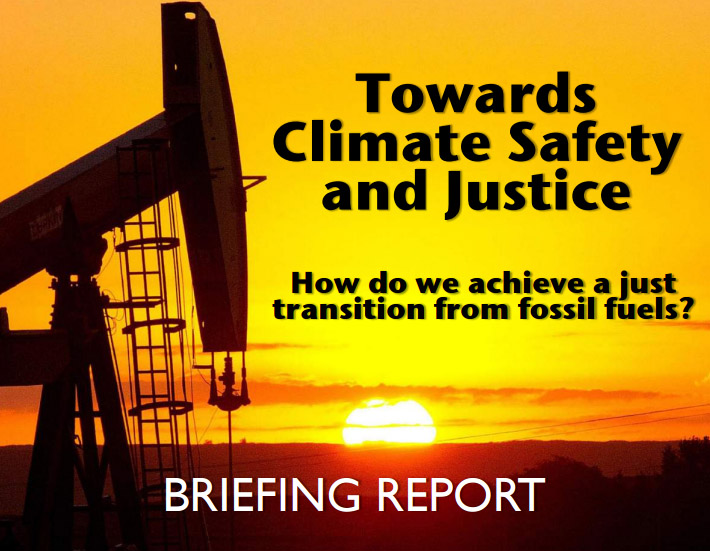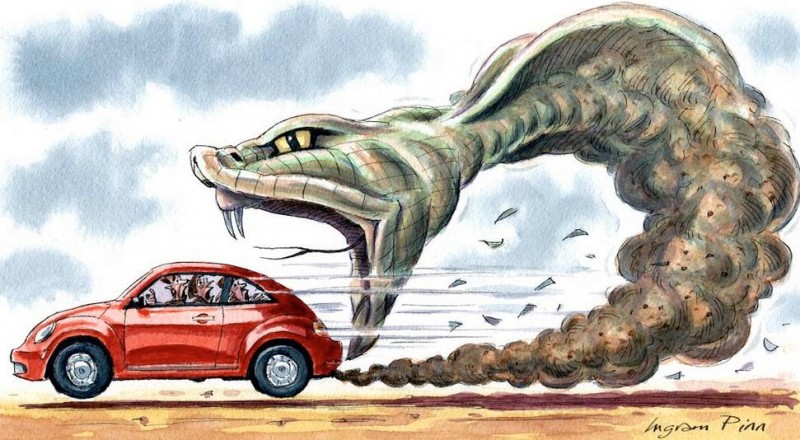Human beings are not a virus

June 4th, 2020
Fintan O’Toole likened human beings to a ‘toxic virus’, and a ‘relentless foulness’ from ‘the Earth’s point of view’, in his article about the Sign of the Times survey on public perceptions of climate change. This has become a recurring theme expressed throughout the pandemic, even as we bear witness to one of humanity’s greatest outpourings of compassion, kindness and solidarity. The relentless foulness is not humanity at large, but merely one method of human economic organising – endless consumption, powered by fossil fuels.
I understand why O’Toole and so many others feel caught in a cycle of hopeless guilt and misanthropy. It feels correct, easy, right to blame oneself and blame a common and natural human selfishness. Yet that ashamed response feels like a well-worn slip road precisely because it fits another dominant overarching narrative: ‘pull yourself up by your bootstraps’. Or, more relevant to the Irish context: ‘we all partied’.
This phrase was used during the last economic crash to obscure the responsibility of its powerful perpetrators — dissipating blame to all Irish people, who received austerity as punishment for perceived personal failings. Yet numerous experts have shown since that the root causes of that banking crisis were caused by structural cyclical faults in capitalism itself as well as what O’Toole described in his book Ship of Foolsas widespread incompetence and corruption in the banking and property sectors.
It is widely assumed that fossil fuels are fundamental to the development of a modern economy. Naturally, in the modern era, human flourishing and the reduction of poverty have been based on oil, gas and coal. Yet environmental historians such as Andreas Malm, Stefanie Barca and Simon Pirani have shown that our reliance on fossil fuels is not normal, nor inevitable.
It was, and is, a political choice that served the needs of but one of a myriad of forms of human economic organising – consumptive capitalism. From the choice of coal-fired steam power over cheap water and wind at the beginning of the Industrial Revolution to undermine co-operation and burgeoning trade unionism. And the prevalence of motorways and the personal car in Europe post WWII, driven by the US Marshall Plan, which sought to secure regional reliance on US-owned fossil fuel reserves and prevent dependency on the USSR.
O’Toole points out how baffling it is that climate change was widely known to be happening from the 1980s, yet nothing was done. What is not pointed out is that — as revealed by Pulitzer prize finalist series #ExxonKnew by Inside Climate News in 2015 and Dutch journalist Jelmer Mommers of De Correspondent on Royal Dutch Shell in 2018 — during the 1980s, the world’s most powerful fossil fuel corporations had planned to switch their business model to renewables on the advice of their own scientists.
Profit margins won out, however, and these companies instead threw their considerable resources behind a public and political misinformation campaign about the scale of the climate crisis. Academics were bribed, think-tanks were established and political representatives funded in a concerted effort to undermine the authority of the world’s finest climate scientists.

When cracks began to show in this strategy in the early 2000s due to a more educated public, fossil fuel companies began to focus on an another strategy – the dissipation of responsibility. As tracked by journalist Meehan Crist, British Petroleum – one of 100 companies responsible for 71 per cent of climate change — sponsored the first carbon footprint calculators in a $100 million US campaign in 2005.
Public-private partnerships with industry, governments and NGOs proliferated to promote the need for individual responsibility and austerity – precisely because it was proven to have little or no impact in reducing fossil fuel use. Today, renewable energy amounts to a mere 3% of BP’s total capital expenditure, while it initiated 13 new fossil fuel projects in 2017 and 2018.
The absurdity and futile nature of such individualised ‘footprint’ campaigns came into sharp focus in Ireland during the Ros Dumhach (Rossport), Co Mayo, conflict against Shell – another of the 100 climate-responsible companies. As local fishermen and farmers who opposed its gas pipeline were intimidated by Shell and falsely imprisoned in 2005, a year later the Government started the Power of One advertising campaign that called on households reduce their consumption of fossil gas by switching off lights.
According to the ESRI, the campaign left no lasting impact on consumer behaviour, despite a cost of €10 million. Indeed, in 2013, the Government spent almost twice as much conducting a seismic survey of Ireland’s sea-floor for the private oil and gas industry, causing major damage to marine life including dolphins, whales and plankton. Today, child climate strikers and climate-vulnerable countries such as the Philippines are fast undermining fossil fuel dependency by taking Exxon and Shell to court for damages under tort and human rights law.
The fact that individualising blame for pollution and climate action obscures true responsibility is not the only reason why it should be avoided. There is a fine line between presenting humans as a ‘virus’ on the earth, and presenting humans as a species in need of a ‘cull’. Both arguments stoke racist, colonial, eugenic and simply misanthropic arguments that historically have diverted attention from the actions of those that benefit most from a vastly unequal socio-economic system.
The history of climate action at an international level follows a similar tune of the powerful bullying the poor and obfuscating the truth. The United Nations agreements to tackle climate change have been one long battle by developing countries and sinking small island states against the same dominant narrative that ‘we all partied’. The hard-won ‘climate justice’ Article 3 of the 1992 United Nations Framework Convention on Climate Change (UNFCCC) states that all parties to the treaty have ‘common but differentiated responsibilities’ in tackling climate change. This is a recognition that, while all countries and peoples contribute to pollution, they do so to completely different degrees.
Wealthy people and wealthy countries overwhelming contribute most emissions to the atmosphere. A 2015 study by Oxfam revealed the world’s richest 10% produce half of all carbon emissions while the poorest 3.5 billion account for just a tenth. Carbon space is limited and, in economies still largely based on fossil fuels, developing countries – many of them former colonies — needed that space to rise out of poverty. These countries argued from the 1970s that the moral duty to tackle climate change, as explicitly stated within Article 3 of the UNFCCC, is primarily on the wealthy to cut their emissions and bear the financial burden of action.
In response to this moral claim, ‘moral panic’ campaigns about world over-population gained popularity in wealthy countries such as the United States under the Clinton administration. Think-tanks such as the UK’s Population Matters argued that developing countries were causing climate change and their own poverty because they had simply too many citizens. There would be plenty of wealth and carbon space for everyone if poor people simply stopped procreating. Rich countries were encouraged to do all they could to fund population control programmes in, and increase restrictions on migrants from, poorer countries as the prospect of a better life for their children encouraged larger families.
It is worth noting that these well-worn racist, colonial — and indeed Malthusian — arguments were also used during the Irish famine to support the laissez-faire and utilitarian economics of the colonial British administration. It was au fait at the time for hobbyist environmentalists amongst the gentry to pontificate on whether the exotic Irish landscape was being damaged by an overpopulating ‘Papist poor’. Others, such as William Morris and Oscar Wilde, offered more sophisticated arguments, pointing to reliance on inequality and relentless market consumption as driving desperation.

So, in our dire climatic moment, with people expressing disillusion and powerlessness in the Sign of the Times survey on climate, where is the hope? O’Toole calls for ‘effective collective action’. Buoyed by our present solidarity, let us look to Ireland’s own historical fights to protect the environment and each other.
In the 1970s, Ireland was the home of one of the first and most successful anti-nuclear campaigns in the world. To defeat the building of a nuclear plant at Carnsore point, Co. Wexford, whole swathes of Irish society bonded together for a common cause.
Trade unions within the ESB took a leading role in educating their members, passing motions at ICTU conferences opposing nuclear energy in Ireland due its public health risks, connection to militarisation and low-quality jobs. Local, nationwide and international public support was built with doctors, nurses, farmers, faith groups, the anti-war movement and environmentalists. Artists, musicians and youth culture rallied around a profound joyous cultural moment in Irish history: organising Ireland’s first ‘Woodstock’ and outdoor musical festival – the Anti-Nuclear Power Show at Carnsore Point. The gigs ran for three years between 1978 to 1980 and featured Christy Moore, Chris De Burgh, the Hothouse Flowers, Clannad and The Dubliners. It evoked such a powerful and positive reaction, it helped inspire No Nukes concerts across the world.

The anti-nuclear campaign thrived because it was based on a joyful re-envisioning of a peaceful, pollution and exploitation-free future — and there is no doubt that the fossil fuel industry learnt from the mistakes of its pro-nuclear cousins. In a leaked Shell memo from 1998 called ‘Group Scenarios 1998-2020’, the company predicted that public outrage against fossil fuel companies would soon build to the point that young people would protest in the streets, that court cases would be taken across the globe and direct action campaigns would escalate. The fossil fuel industry predicted the school strikers, the growing wave of climate litigation and Extinction Rebellion.
Humans are not a virus. Fossil fuel companies have been preparing for our present moment for decades. Make no mistake: the shame and guilt we feel through the individualisation of climate action is a deliberate ploy to obscure the root causes of climate change in company investment strategies and the state policies to facilitate them. That unfettered power and profit-seeking is our virus and rightly our focus for O’Toole’s ‘effective collective action’.
Let us build on the anti-nuclear movement’s positivity and collective re-envisioning of the future as we rebuild our world post-Covid19. Let us build a just transition to get there, for publicly-owned renewables, for an end to energy poverty, for an end to energy produced through exploitation at home or abroad.
Author: Sinéad Mercier







